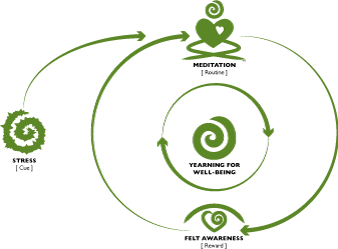fact melts away the fear…
A Habit of ‘Meditative Mind’
by meditative - July 28th, 2020.Filed under: Insights for Mindful Intelligence.
According to MIT researchers, the power of habit starts with a simple neurological loop consisting of a ‘cue’… following with a ‘routine’… while reinforced with some kind of ‘reward’ or ‘benefit’. Underlying the reward or benefit, there is often a strong belief or conviction that is fueled by a craving & yearning to sustain a particular routine. For some who develop a real devotion for contemplative routines, it may be a yearning for greater well-being, spiritual growth, etc.
Stressors (cues) are natural habits of mind. They arise from different challenges & difficulties we have in facing & working with perceived changes & uncertainties in our lives. When chronic, they often adversely affect our quality of mind, body, and being. Meditation practice can become an effective routine to help us work with our stressors. It can help us to notice, acknowledge and better understand the cues and impulsivities we have to habitually react in certain ways toward our stressors. More often than not, our impulses to act are deeply conditioned in our subconscious. We need some kind of deliberate and reflexive pause with a “meditative mind” to even detect their arising.
With time and repetition in our meditation routine, we can systematically develop a more relaxed and stable “felt” or “embodied” awareness toward our stressors. We can learn to be more responsive and less reactive to the changes that bring us challenge and uncertainty. What we truly embrace and feel openly and objectively, we can come to understand and integrate as part of our developmental process.
To work directly and deliberately with our “stressors” through our meditation routine, we can cultivate real and lasting benefits (rewards) of “felt awareness” like relaxation, calm, alertness, aliveness, concentration, balance, ease, clarity, self-regulation, etc. A refined sense of this “felt awareness” can ultimately improve our quality of mind, body, and being. It can help ameliorate our reactive tendencies toward our stressors as well as our tentative perception of them. To cultivate a “sitting habit” that is peaceful, still, and quiet, with life as it is… we can learn to make more appropriate and fulfilling choices empowered with a meditative mind of greater confidence and compassion.
Whether “on” or “off” the cushion, we can apply our meditative mind habitually and reflexively in our day-to-day experiences. With practice, repetition, and clear intention, we can routinely benefit from being more responsive & less reactive as well as continue to refine our inner capacities of awareness and well-being.
What’s feeling happy & less stressed in your everyday life mean to you? Can sustaining a “meditative mind” tap your primordial capacity for well-being? A meditation practice may be just the routine that not only transforms your state of mind, but your way of being, acting, and living.
Comments
Leave a Reply
You must be logged in to post a comment.

